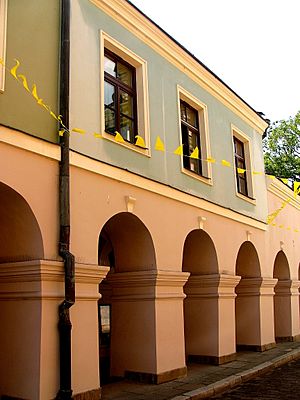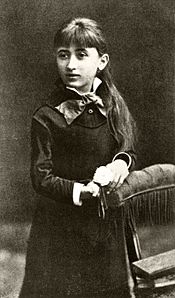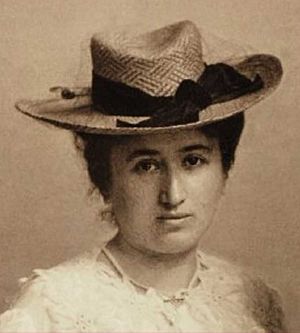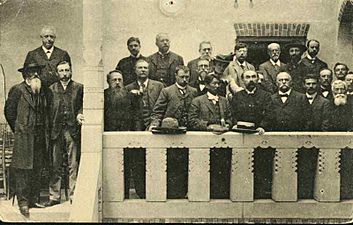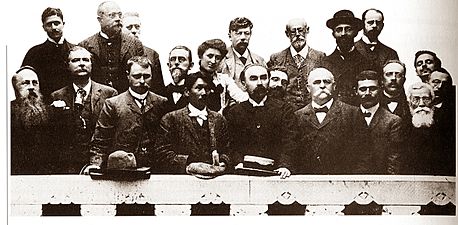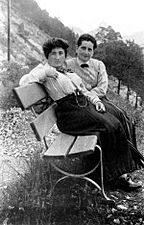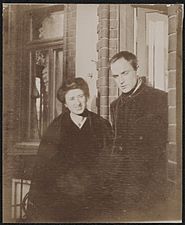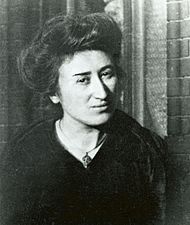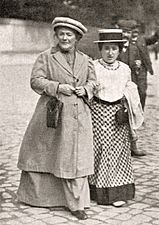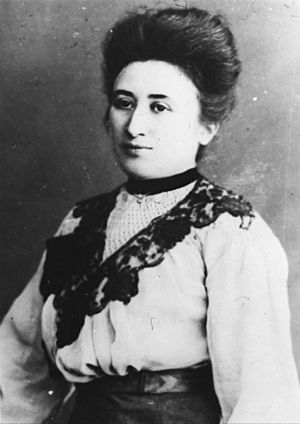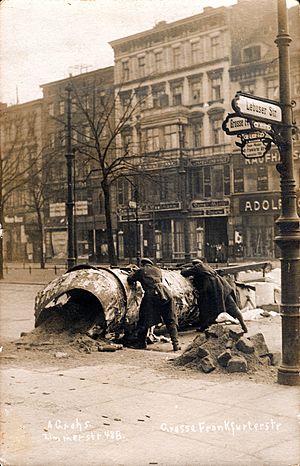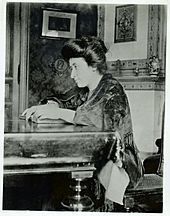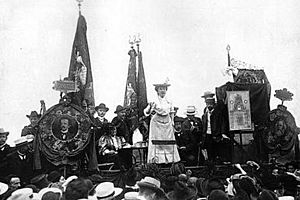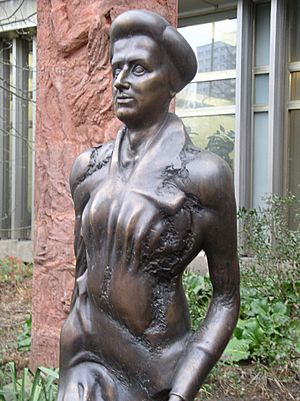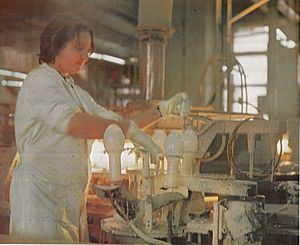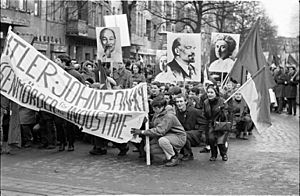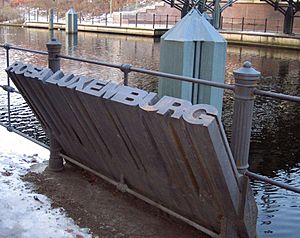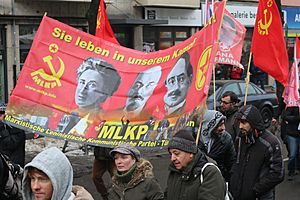Rosa Luxemburg facts for kids
Quick facts for kids
Rosa Luxemburg
|
|
|---|---|
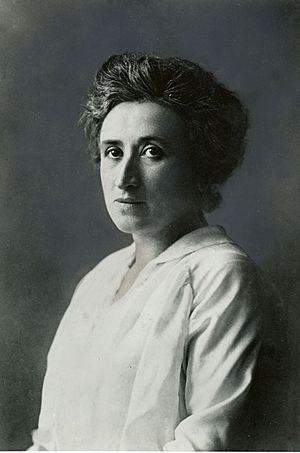
Luxemburg, c. 1895–1905
|
|
| Born |
Rozalia Luksenburg
5 March 1871 Zamość, Congress Poland, Russian Empire
|
| Died | 15 January 1919 (aged 47) |
| Alma mater | University of Zurich (Dr. jur., 1897) |
| Occupation |
|
| Political party |
|
| Spouse(s) |
Gustav Lübeck
(m. 1897, divorced) |
| Partner(s) |
|
| Signature | |
Rosa Luxemburg (Polish: [ˈruʐa ˈluksɛmburk]; German: [ˈʁoːza ˈlʊksəmbʊʁk]; Polish: Róża Luksemburg or Rozalia Luksenburg; 5 March 1871 – 15 January 1919) was a Polish and naturalised-German revolutionary socialist, Marxist philosopher and anti-war activist.
Born and raised in a secular Jewish family in Congress Poland, she became a German citizen in 1897. Successively, she was a member of the Proletariat party, the Social Democracy of the Kingdom of Poland and Lithuania (SDKPiL), the Social Democratic Party of Germany (SPD), the Independent Social Democratic Party (USPD), the Spartacus League (Spartakusbund), and the Communist Party of Germany (KPD).
After the SPD supported German involvement in World War I in 1915, Luxemburg and Karl Liebknecht co-founded the anti-war Spartacus League (Spartakusbund) which eventually became the KPD. During the November Revolution, she co-founded the newspaper Die Rote Fahne (The Red Flag), the central organ of the Spartacist movement. Luxemburg considered the Spartacist uprising of January 1919 a blunder, but supported the attempted overthrow of the SPD-ruled Weimar Republic and rejected any attempt at a negotiated solution. Friedrich Ebert's SPD Cabinet crushed the revolt and the Spartakusbund by sending in the Freikorps, government-sponsored paramilitary groups consisting mostly of battle-hardened World War I veterans of the Imperial German Army. Freikorps troops captured and assassinated Luxemburg and Liebknecht during the rebellion.
Due to her pointed criticism of both the Leninist and the more moderate social democratic schools of Marxism, Luxemburg has always had a somewhat ambivalent reception among scholars and theorists of the political left. Nonetheless, Luxemburg and Liebknecht were extensively idolised as communist martyrs by the East German communist government. The German Federal Office for the Protection of the Constitution (BVS) asserts that idolization of Luxemburg and Liebknecht is an important tradition of the 21st-century German far-left. Despite her own Polish nationality and strong ties to Polish culture, opposition from the PPS due to her stance against the 1918 independence of the Second Polish Republic and later criticism from Stalinists have made her a controversial historical figure in the present-day political discourse of the Third Polish Republic.
Life
Poland
Ancestry
Little is known about Rozalia's great-grandparents, Elisza and Szayndla, but according to historical evidence it is likely they lived in Warsaw. Their son, Rosa's grandfather, Abraham Luxemburg probably lived in Warsaw before marrying Chana Szlam (Rosa's grandmother) and moving to Zamość. Abraham built a successful timber business there, based in Zamość and Warsaw but with links as far away as Danzig, Leipzig, Berlin, and Hamburg; although coming from humble origins, he became a wealthy businessman with transnational connections who could afford to provide for his children an education abroad in the German Empire. He supported the Jewish Reform movement, becoming a prominent member of the Zamość Maskilim. He was committed to Jewish emancipation, spoke Polish and Yiddish, and ensured that his children spoke these tongues too; it is unclear whether he took part in the November Uprising (1830–31) or not.
Abraham's son Edward was Róża's father. He was born in Zamość on 17 December 1830, the eldest of ten siblings and heir to his father's timber business. Edward Eliasz Luxenburg lost his mother at the age of 18. He met his wife Lina Löwenstein through his stepmother Amalia, who was Lina's older sister. Lina and Amalia were daughters of the Rabbi of Meseritz, Isaak Ozer Löwenstein, and their brother was the reform Rabbi Isachar Dov Berish (Bernhard) Löwenstein of Lemberg. Lina and Edward married around 1853 and lived together in Zamość, where Edward worked with his father. Like his father, Edward was a leading member of the Reform Jewish community in the city. When the January Uprising broke out, Edward delivered weapons to Polish partisans and organised fundraisers for the insurrection. After the fall of the uprising he became a target of the tsarist police and was forced into hiding in Warsaw, leaving his family behind in Zamość. During the 1860s and 1870s, Edward moved frequently and experienced financial difficulties; eventually the rest of the family, including two-year-old Rosa, joined him in Warsaw in 1873.
Origins
Róża Luksemburg, actual birth name Rozalia Luksenburg, was born on 5 March 1871 at 45 Ogrodowa Street (now 7a Kościuszko Street) in Zamość. The Luxemburg family were Polish Jews living in the Russian sector of Poland, after the country was partitioned by Prussia, Russia and Austria almost a century earlier. She was the fifth and youngest child of Edward Eliasz Luxemburg and Lina Löwenstein. Her father Edward, like his father Abraham, supported the Jewish Reform movement. Luxemburg later stated that her father imparted an interest in liberal ideas to her while her mother was religious and well-read with books kept at home. The family moved to Warsaw in 1873. Polish and German were spoken at home; Luxemburg also learned Russian. After being bed-bound with a hip problem at the age of five, she was left with a permanent limp. Although over time she became fluent in Russian and French, Polish remained Róża's first language with German also spoken at a native level. Rosa was considered intelligent early on, writing letters to her family and impressing her relatives with recitals of poetry, including the Polish classic Pan Tadeusz.
Rory Castle writes: "From her grandfather and father [Rosa] inherited the belief that she was a Pole first and a Jew second, her passionate opposition to Tsarism and her emotional connection to Polish language and culture. Although her parents were religious, they did not consider themselves to be Jewish by nationality, rather 'Poles of the Mosaic persuasion'". He also points out that more recent research into the Luxemburg family and her early years show that "Rosa Luxemburg gained a lot more from her family than has previously been understood by her biographers. Not only in terms of her education, financial support and assistance during her frequent incarcerations, but also in terms of her identity and politics. Her family was a closely knitted support network, even when its members were spread out across Europe. This solid foundation, which supported and encouraged her at every step, gave Luxemburg the intellectual and personal confidence to go out and attempt to change the world". It is especially from Luxemburg's private correspondence that it can be seen she in fact remained very close with her family throughout the years, despite being separated by borders and spread out across countries.
Education and activism
In 1884, she enrolled at an all-girls' gymnasium (secondary school) in Warsaw, which she attended until 1887. The Second Women's Gymnasium was a school that only rarely accepted Polish applicants and acceptance of Jewish children was even more exceptional. The children were only permitted to speak Russian. At this school, Róża attended in secret circles studying the works of Polish poets and writers; officially this was forbidden due to the policy of Russification against Poles that was pursued in the Russian Empire at the time. From 1886, Luxemburg belonged to the illegal Polish left-wing Proletariat Party (founded in 1882, anticipating the Russian parties by twenty years). She began political activities by organising a general strike; as a result, four of the Proletariat Party leaders were put to death and the party was disbanded, though the remaining members, including Luxemburg, kept meeting in secret. In 1887, she passed her matura (secondary school graduation) examinations.
Róża became wanted by the tsarist police due to her activity in Proletariat; she hid in the countryside, working as private tutor at a dworek. In order to escape detention, she fled to Switzerland through the "green border" in 1889. There she attended the University of Zurich (as did the socialists Anatoly Lunacharsky and Leo Jogiches), where she studied philosophy, history, politics, economics, and mathematics. She specialised in Staatswissenschaft (political science), economic and stock exchange crises, and the Middle Ages. Her doctoral dissertation "The Industrial Development of Poland" (Die Industrielle Entwicklung Polens) was officially presented in the spring of 1897 at the University of Zurich which awarded her a Doctor of Law degree. Her dissertation was published by Duncker and Humblot in Leipzig in 1898. An oddity in Zurich, she was one of the first women in the world with a doctorate in economy and the first Polish woman to achieve this.
In 1893, with Leo Jogiches and Julian Marchlewski (alias Julius Karski), Luxemburg founded the newspaper Sprawa Robotnicza (The Workers' Cause) which opposed the nationalist policies of the Polish Socialist Party. Luxemburg believed that an independent Poland could arise and exist only through socialist revolutions in Germany, Austria-Hungary and Russia. She maintained that the struggle should be against capitalism, not just for Polish independence. Her position of denying a national right of self-determination provoked a philosophic disagreement with Vladimir Lenin. She and Leo Jogiches co-founded the Social Democracy of the Kingdom of Poland and Lithuania (SDKPiL) party, after merging Congress Poland's and Lithuania's social democratic organisations. Despite living in Germany for most of her adult life, Luxemburg was the principal theoretician of the Social Democracy of the Kingdom of Poland (SDKP, later the SDKPiL) and led the party in a partnership with Jogiches, its principal organiser. She remained sentimental towards Polish culture, her favourite poet was Adam Mickiewicz, and she vehemently opposed the Germanisation of Poles in the Prussian Partition; in 1900 she published a brochure against this in Poznań. Earlier, in 1893, she also wrote against the Russification of Poles by the Russian Empire's absolutist government.
The 1905 revolution
After the 1905 revolution broke out, against the advice of her Polish and German comrades, Luxemburg left for Warsaw. If she were to be recognised then the tsarist authorities would imprison her, but the October/November political strike, part of the upheaval in Russia with particularly active elements in Congress Poland, convinced Róża that at this time her place was in Warsaw instead of Berlin. She arrived there on 30 December thanks to her German friend Anna Matschke's passport and met up with Jogiches, who had returned to Warsaw a month earlier also on a false passport; they lived together in a pension at the corner of Jasna and Świętokrzyska streets, from where they wrote for the SDKPiL's illegally published paper Czerwony Sztandar (The Red Banner). Luxemburg was one of the first writers to notice the 1905 revolution's potential for democratisation within the Russian Empire. In the years 1905-1906 alone, she made in Polish and German over 100 articles, brochures, appeals, texts, and speeches about the revolution. Although only the closest friends and comrades of Jogiches and Luxemburg knew of their return to the country, thanks to an agent placed by the tsarist authorities within the SDKPiL leadership the Okhrana came to arrest them on 4 March 1906.
They held her prisoner first at the ratusz jail, then at Pawiak prison and later at the Tenth Pavilion of the Warsaw Citadel. Luxemburg continued to write for the SDKPiL in secret behind prison walls; her works were smuggled out of the facility. After two officers of the Okhrana were bribed by her relatives, a temporary release on bail was secured for her on 28 June 1906 for health reasons until the court trial; at the start of August, through St. Petersburg she left for Kuokkala, then part of the Grand Duchy of Finland (which was an autonomous part of the Russian Empire). From there, in the middle of September, she managed to secretly flee to Germany.
Germany
Luxemburg wanted to move to Germany to be at the centre of the party struggle, but she had no way of obtaining permission to remain there indefinitely. In April 1897 she married the son of an old friend, Gustav Lübeck, in order to gain German citizenship. They never lived together and they formally divorced five years later. She returned briefly to Paris, then moved permanently to Berlin to begin her fight for Eduard Bernstein's constitutional reform movement. Luxemburg hated the stifling conservatism of Berlin. She despised Prussian men and resented what she saw as the grip of urban capitalism on social democracy. In the Social Democratic Party of Germany's women's section, she met Clara Zetkin, whom she made a lifelong friend. Between 1907 and his conscription in 1915, she was involved in a love affair with Clara's younger son, Kostja Zetkin, to whom approximately 600 surviving letters (now mostly published) bear testimony. Luxemburg was a member of the uncompromising left-wing of the SPD. Their clear position was that the objectives of liberation for the industrial working class and all minorities could be achieved by revolution only.
The recently published Letters of Rosa Luxemburg shed important light on her life in Germany. As Irene Gammel writes in a review of the English translation of the book in The Globe and Mail: "The three decades covered by the 230 letters in this collection provide the context for her major contributions as a political activist, socialist theorist and writer". Her reputation was tarnished by Joseph Stalin's cynicism in Questions Concerning the History of Bolshevism. In his rewriting of Russian events, he placed the blame for the theory of permanent revolution on Luxemburg's shoulders, with faint praise for her attacks on Karl Kautsky which she commenced in 1910.
According to Gammel, "In her controversial tome of 1913, The Accumulation of Capital, as well as through her work as a co-founder of the radical Spartacus League, Luxemburg helped to shape Germany's young democracy by advancing an international, rather than a nationalist, outlook. This farsightedness partly explains her remarkable popularity as a socialist icon and its continued resonance in movies, novels and memorials dedicated to her life and oeuvre". Gammel also notes that for Luxemburg "the revolution was a way of life" and yet that the letters also challenge the stereotype of "Red Rosa" as a ruthless fighter. However, The Accumulation of Capital sparked angry accusations from the Communist Party of Germany. In 1923, Ruth Fischer and Arkadi Maslow denounced the work as "errors", a derivative work of economic miscalculation known as "spontaneity".
Luxemburg continued to identify as Polish and disliked living in Germany, which she saw as a political necessity, making various negative comments about contemporary German society in her private correspondence that was written in Polish; at the same time, she loved the works of Johann Wolfgang von Goethe and showed an appreciation for German literature. However, she also preferred Switzerland to Berlin and greatly missed being around the Polish language and culture.
Before World War I
When Luxemburg moved to Germany in May 1898, she settled in Berlin. She was active there in the left wing of the SPD in which she sharply defined the border between the views of her faction and the revisionism theory of Eduard Bernstein. She attacked him in her brochure Social Reform or Revolution?, released in September 1898. Luxemburg's rhetorical skill made her a leading spokesperson in denouncing the SPD's reformist parliamentary course. She argued that the critical difference between capital and labour could only be countered if the proletariat assumed power and effected revolutionary changes in methods of production. She wanted the revisionists ousted from the SPD. That did not occur, but Kautsky's leadership retained a Marxist influence on its programme.
From 1900, Luxemburg published analyses of contemporary European socio-economic problems in newspapers. Foreseeing war, she vigorously attacked what she saw as German militarism and imperialism. Luxemburg wanted a general strike to rouse the workers to solidarity and prevent the coming war. However, the SPD leaders refused and she broke with Kautsky in 1910. Between 1904 and 1906, she was imprisoned for her political activities on three occasions. In 1907, she went to the Russian Social Democrats' Fifth Party Day in London, where she met Vladimir Lenin. At the socialist Second International Congress in Stuttgart, her resolution demanding that all European workers' parties should unite in attempting to stop the war was accepted.
Luxemburg taught Marxism and economics at the SPD's Berlin training centre. Her former student Friedrich Ebert became the SPD leader and later the Weimar Republic's first President. In 1912, Luxemburg was the SPD representative at the European Socialists' congresses. With French socialist Jean Jaurès, Luxemburg argued that European workers' parties should organise a general strike when war broke out. In 1913, she told a large meeting: "If they think we are going to lift the weapons of murder against our French and other brethren, then we shall shout: 'We will not do it!'" However, when nationalist crises in the Balkans erupted into violence and then the war in 1914, there was no general strike and the SPD majority supported the war as did the French Socialists. The Reichstag unanimously agreed to finance the war. The SPD voted in favour of that and agreed to a truce (Burgfrieden) with the Imperial government, promising to refrain from any strikes during the war. This led Luxemburg to strong frustration as the revisionism she had fought since 1899 had triumphed.
In response, Luxemburg organised anti-war demonstrations in Frankfurt, calling for conscientious objection to military conscription and the refusal to obey orders. On that account, she was imprisoned for a year for "inciting to disobedience against the authorities' law and order". Shortly after her death, her fame was alluded to by Grigory Zinoviev at the Petrograd Soviet on 18 January 1919 as he adjudged her astute assessment of Bolshevism.
-
Clara Zetkin and Rosa Luxemburg in 1910
During the war
In August 1914, Luxemburg, along with Karl Liebknecht, Clara Zetkin, and Franz Mehring, founded the Die Internationale ("The International") group which became the Spartacus League in January 1916. They wrote illegal anti-war pamphlets pseudonymously signed Spartacus after the slave-liberating Thracian gladiator who opposed the Romans. Luxemburg's pseudonym was Junius, after Lucius Junius Brutus, founder of the Roman Republic. The Spartacus League vehemently rejected the SPD's support in the Reichstag for funding the war, and urged Germany's labor unions to declare an anti-war general strike. As a result, Luxemburg and Liebknecht were imprisoned in June 1916 for two and a half years. During imprisonment, Luxemburg was twice relocated, first to Posen (now Poznań), then to Breslau (now Wrocław).
Luxemburg continued to write and friends secretly smuggled out and illegally published her articles. Among them was Die Russische Revolution, criticising the Bolsheviks and accusing them of seeking to impose a totalitarian single party state upon the Soviet Union. In that context, she wrote the infamous dictum "Freiheit ist immer die Freiheit des Andersdenkenden" ("Freedom is always the freedom of the one who thinks differently") and continues in the same chapter: "The public life of countries with limited freedom is so poverty-stricken, so miserable, so rigid, so unfruitful, precisely because, through the exclusion of democracy, it cuts off the living sources of all spiritual riches and progress". Another article written in April 1915 when in prison and published and distributed illegally in June 1916 originally under the pseudonym Junius was Die Krise der Sozialdemokratie (The Crisis of Social Democracy), also known as the Junius-Broschüre or The Junius Pamphlet.
In 1917, the Spartacus League was affiliated with the Independent Social Democratic Party (USPD), founded by Hugo Haase and made up of anti-war former SPD members.
According to Russian historian Edvard Radzinsky, "The Bolshevik envoy in Berlin began secretly purchasing arms for the German revolutionaries. A little while ago the Germans had been assisting revolution in Russia. Now Lenin was reciprocating. The Bolshevik embassy became the headquarters of the German revolution."
In November 1918, the USPD and the SPD assumed power in the newly created Weimar Republic, which many subsequent historians have critically termed, "a Republic without republicans", upon the 9 November abdication of Emperor Wilhelm II. This followed the German Revolution that began with the Kiel mutiny, when workers' and soldiers' councils seized most of Germany to put an end to World War I and to the monarchy. The USPD and most of the SPD members supported the councils while the SPD leaders feared this could lead to a Räterepublik (council republic) like the soviets of the Russian Revolutions of 1905 and 1917.
German Revolution of 1918–1919
Luxemburg was freed from prison in Breslau on 8 November 1918, three days before the armistice of 11 November 1918. One day later, Karl Liebknecht, who had also been freed from prison, proclaimed the Free Socialist Republic (Freie Sozialistische Republik) in Berlin. He and Luxemburg reorganised the Spartacus League and founded The Red Flag (Die Rote Fahne) newspaper, demanding amnesty for all political prisoners and the abolition of capital punishment in the essay Against Capital Punishment. On 14 December 1918, they published the new programme of the Spartacus League.
From 29 to 31 December 1918, they took part in a joint congress of the League, independent socialists and the International Communists of Germany (IKD) that led to the foundation on 1 January 1919 of the Communist Party of Germany (KPD) under the leadership of Liebknecht and Luxemburg. Luxemburg supported the new KPD's participation in the Weimar National Assembly that founded the Weimar Republic, but she was out-voted and the KPD boycotted the elections.
In January 1919, a second revolutionary wave swept Berlin.
Like Liebknecht, Luxemburg supported the violent putsch attempt. The Red Flag encouraged the rebels to occupy the editorial offices of the liberal press and later, all positions of power. On 8 January, Luxemburg's Red Flag printed a public statement by her, in which she called for revolutionary violence and no negotiations with the revolution's "mortal enemies", the Friedrich Ebert-Philipp Scheidemann government.
Assassination and aftermath
In response to the uprising, Luxemburg's former student, German Chancellor and SPD leader Friedrich Ebert ordered the Freikorps to suppress the Soviet backed attempt at revolution, which was successfully crushed by 11 January 1919. Meanwhile, Luxemburg's Red Flag falsely claimed that the rebellion was spreading across Germany.
Luxemburg and Liebknecht were taken prisoner in Berlin on 15 January 1919 by the Guards Cavalry Rifle Division of the Freikorps (Garde-Kavallerie-Schützendivision). The unit's officer commanding, Captain Waldemar Pabst, with Lieutenant Horst von Pflugk-Harttung, questioned them and then gave the order to summarily execute them.
The assassinations of Luxemburg and Liebknecht were the beginning of a new wave of paramilitary violence in Berlin and across Germany. Finally, the People's Navy Division (Volksmarinedivision) and workers' and soldiers' unions, which had moved to the political far left, were disbanded.
The last part of the German Revolution saw many instances of armed violence and strike action throughout Germany. Significant strikes occurred in Berlin, the Bremen Soviet Republic, Saxony, Saxe-Gotha, Hamburg, the Rhinelands and the Ruhr region. Last to strike was the Bavarian Soviet Republic which was suppressed on 2 May 1919.
According to historians Edvard Radzinsky, Soviet Premier Vladimir Lenin retaliated for Liebknecht and Luxemburg's murder by issuing orders to Gregory Zinoviev for the immediate arrest and summary execution of four Grand Dukes from the recently deposed House of Romanov, all of whom were uncles of the last Tsar. Despite the pleas of Maxim Gorky on behalf of one of the condemned, the known progressive and noted historian Grand Duke Nikolai Mikhailovich, all four men were shot on 30 January 1919 at the Peter and Paul Fortress in Petrograd. The other three victims were the Grand Duke George Mikhailovich, the Grand Duke Paul Alexandrovich and the Grand Duke Dmitri Constantinovich.
Pvt. Otto Runge was sentenced to two years' imprisonment (for "attempted manslaughter") and Lieutenant Vogel to four months. However, Vogel escaped after a brief custody. Captain Pabst and Lt. Souchon were never prosecuted. The Nazis later compensated Pvt. Runge for having been jailed, but he died in Berlin in NKVD custody after the end of World War II. The Nazis also later merged the Garde-Kavallerie-Schützendivision into the SA. In an interview with German news magazine Der Spiegel in 1962 and again in his memoirs, Captain Pabst alleged that Defence Minister Gustav Noske and Weimar Republic Chancellor Friedrich Ebert, had both covertly approved of his actions. His account has been neither confirmed nor disproven since the case has not been examined by parliament or the courts. In 1993, Gietinger's research on his access to the previously restricted papers of Pabst, held at the Federal Military Archives, found him as central to the planning of the murder of Luxemburg and the shielding of those who acted under his orders from subsequent criminal prosection.
Annual demonstration
In the city of Berlin a Liebknecht-Luxemburg Demonstration, shortened to LL-Demo, is organised annually in the month of January around the date of their death. This demonstration takes place on the second weekend of the month in Berlin-Friedrichshain, starting near the Frankfurter Tor to the their graves in the central cemetery Friedrichsfelde, also known as the Gedenkstätte der Sozialisten (Socialist Memorial). In East Germany, the event was widely considered to be a mere show for Socialist Unity Party of Germany politicians and celebrities, which was broadcast live on state television.
During the Peaceful Revolution, the annual parade in East Berlin honoring the deaths of Liebknecht and Luxemburg was used by East German dissidents as part of their campaign, "to raise their unwelcome demands at embarrassing moments for the regime". On January 17, 1988, as Premier Erich Honecker was reviewing the parade, a group of dissidents broke through the ranks of the Free German Youth and unfurled banners bearing Rosa Luxemburg's infamous dictum from Die Russische Revolution, "Freiheit ist immer die Freiheit des Andersdenkenden" ("True freedom is always the freedom of the non-conformists!") Viewers of the parade were then subjected to the deeply ironic sight of Stasi agents savagely beating up and arresting everyone who brandished the slogan.
In January 2019, the German left-wing parties commemorated at the occasion of this demonstration the 100th anniversary of the summary execution of Luxemburg and Liebknecht.
Thought
Revolutionary socialist democracy
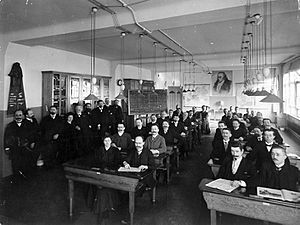
Luxemburg professed a commitment to democracy and the necessity of revolution. Luxemburg's idea of democracy which Stanley Aronowitz calls "generalized democracy in an unarticulated form" represents Luxemburg's greatest break with "mainstream communism" since it effectively diminishes the role of the communist party, but it is in fact very similar to the views of Karl Marx ("The emancipation of the working classes must be conquered by the working classes themselves"). According to Aronowitz, the vagueness of Luxemburgian democracy is one reason for its initial difficulty in gaining widespread support. Luxemburg herself clarified her position on democracy in her writings regarding the Russian Revolution and the Soviet Union. Early on, Luxemburg attacked undemocratic tendencies present in the Russian Revolution:
Without general elections, without unrestricted freedom of press and assembly, without a free struggle of opinion, life dies out in every public institution, becomes a mere semblance of life, in which only the bureaucracy remains as the active element. Public life gradually falls asleep, a few dozen party leaders of inexhaustible energy and boundless experience direct and rule. Among them, in reality only a dozen outstanding heads do the leading and an elite of the working class is invited from time to time to meetings where they are to applaud the speeches of the leaders, and to approve proposed resolutions unanimously – at bottom, then, a clique affair – a dictatorship, to be sure, not the dictatorship of the proletariat but only the dictatorship of a handful of politicians, that is a dictatorship in the bourgeois sense, in the sense of the rule of the Jacobins (the postponement of the Soviet Congress from three-month periods to six-month periods!) Yes, we can go even further: such conditions must inevitably cause a brutalization of public life... (Lenin's speech on discipline and corruption.)
The Accumulation of Capital
The Accumulation of Capital was the only work Luxemburg officially published on economics during her lifetime. In the polemic, she argued that capitalism needs to constantly expand into non-capitalist areas in order to access new supply sources, markets for surplus value and reservoirs of labour. According to Luxemburg, Marx had made an error in Das Kapital in that the proletariat could not afford to buy the commodities they produced and by his own criteria it was impossible for capitalists to make a profit in a closed-capitalist system since the demand for commodities would be too low and therefore much of the value of commodities could not be transformed into money. According to Luxemburg, capitalists sought to realise profits through offloading surplus commodities onto non-capitalist economies, hence the phenomenon of imperialism as capitalist states sought to dominate weaker economies. However, this was leading to the destruction of non-capitalist economies as they were increasingly absorbed into the capitalist system. With the destruction of non-capitalist economies, there would be no more markets to offload surplus commodities onto and capitalism would break down.
The Accumulation of Capital was harshly criticised by both Marxist and non-Marxist economists on the grounds that her logic was circular in proclaiming the impossibility of realising profits in a close-capitalist system and that her underconsumptionist theory was too crude. Her conclusion that the limits of the capitalist system drive it to imperialism and war led Luxemburg to a lifetime of campaigning against militarism and colonialism.
Dialectic of Spontaneity and Organisation
The Dialectic of Spontaneity and Organisation was the central feature of Luxemburg's political philosophy, wherein spontaneity is a grassroots approach to organising a party-oriented class struggle. She argued that spontaneity and organisation are not separable or separate activities, but different moments of one political process as one does not exist without the other.
Luxemburg did not hold spontaneism as an abstraction, but she developed the Dialectic of Spontaneity and Organisation under the influence of mass strikes in Europe, especially the Russian Revolution of 1905.
Criticism of the October Revolution
In an article published just before the October Revolution, Luxemburg characterised the Russian February Revolution of 1917 as a "revolution of the proletariat" and said that the "liberal bourgeoisie" were pushed to movement by the display of "proletarian power". The task of the Russian proletariat, she said, was now to end the "imperialist" world war in addition to struggling against the "imperialist bourgeoisie". The world war made Russia ripe for a socialist revolution. Therefore, "the German proletariat are also [...] posed a question of honour, and a very fateful question".
In several works, including an essay written from jail and published posthumously by her last companion Paul Levi (publication of which precipitated his expulsion from the Third International), titled The Russian Revolution, Luxemburg sharply criticised some Bolshevik policies such as their suppression of the Constituent Assembly in January 1918 and their policy of supporting the purported right of all national peoples to self-determination. According to Luxemburg, the Bolsheviks' strategic mistakes created tremendous dangers for the Revolution such as its bureaucratisation.
Her sharp criticism of the October Revolution and the Bolsheviks was lessened insofar as she compared the errors of the Revolution and of the Bolsheviks with the "complete failure of the international proletariat".
Bolshevik theorists such as Vladimir Lenin and Leon Trotsky responded to this criticism by arguing that Luxemburg's notions were classical Marxist ones, but they could not be applied to Russia of 1917. They stated that the lessons of actual experience such as the confrontation with the bourgeois parties had forced them to revise the Marxian strategy. As part of this argument, it was pointed out that after Luxemburg herself got out of jail, she was also forced to confront the National Assembly in Germany, a step they compared with their own conflict with the Russian Constituent Assembly.
After the October Revolution, it becomes the "historic responsibility" of the German workers to carry out a revolution for themselves and thereby end the war.
Epitaph on her death
In later years, Trotsky frequently defended Luxemburg, claiming that Joseph Stalin had vilified her. In the article "Hands Off Rosa Luxemburg!", Trotsky criticised Stalin for this despite what Trotsky perceived as Luxemburg's theoretical errors, writing: "Yes, Stalin has sufficient cause to hate Rosa Luxemburg. But all the more imperious therefore becomes our duty to shield Rosa's memory from Stalin's calumny that has been caught by the hired functionaries of both hemispheres, and to pass on this truly beautiful, heroic, and tragic image to the young generations of the proletariat in all its grandeur and inspirational force".
Quotations
- Luxemburg's perhaps best-known quotation "Freiheit ist immer nur Freiheit des anders Denkenden" (sometimes translated as "Freedom is always the freedom of dissenters") is an excerpt from the following passage:
- "The capitalist state of society is doubtless a historic necessity, but so also is the revolt of the working class against it – the revolt of its gravediggers." (April 1915)
- "Without general elections, without unrestricted freedom of press and assembly, without a free struggle of opinion, life dies out in every public institution, becomes a mere semblance of life, in which only the bureaucracy remains as the active element."
- "For us there is no minimal and no maximal program; socialism is one and the same thing: this is the minimum we have to realize today."
- "Today, we face the choice exactly as Friedrich Engels foresaw it a generation ago: either the triumph of imperialism and the collapse of all civilization as in ancient Rome, depopulation, desolation, degeneration – a great cemetery. Or the victory of socialism, that means the conscious active struggle of the international proletariat against imperialism and its method of war."
- "Most of those bourgeois women who act like lionesses in the struggle against 'male prerogatives' would trot like docile lambs in the camp of conservative and clerical reaction if they had suffrage." (Luxemburg's famous observation and critique of liberal feminism)
- "Imperialism is the political expression of the accumulation of capital in its competitive struggle for what remains still open of the non-capitalist environment."
Legacy
Poland
In spite of her own Polish nationality and strong ties to Polish culture, her opposition to the independence of the Second Polish Republic and later criticism from Stalinists have made Róza Luksemburg a controversial historical figure in the modern Third Polish Republic's political discourse.
During the Polish People's Republic, a manufacturing facility of electric lamps in the Wola district of Warsaw (Polish capital and the place where Luksemburg was raised and grew up), was established and named after Róża Luksemburg as the Zakłady Wytwórcze Lamp Elektrycznych im. Róży Luksemburg (pl). After the transformation and change of regime, the factory was privatised in 1991 and then split up into four different companies; the factory buildings were sold by 1993 and fell into disuse in 1994.
A street in Szprotawa used to be named after Luksemburg (ulica Róży Luksemburg ) until it was changed to ulica Różana (Rose street) in September 2018. Many other streets and locations in Poland either used to be or still are named after Róża Luksemburg, such as those in Warsaw, Gliwice, Będzin, Szprotawa, Lublin, Polkowice, Łódź, etc.
Efforts to put up commemorative plaques in memory of Luksemburg have taken place in a number of Polish cities, such as Poznań and her birthplace Zamość. A 45-minute-long sightseeing tour around areas associated with the life of the Polish revolutionary was organised in Warsaw in 2019, where a statue of Róża by Alfred Jesion was also put on display at the Warsaw Citadel as part of the Gallery of Polish Sculpture of the 1950s.
The commemorative plaque in Poznań, in memory of Luksemburg, that is on the building she lived in during May 1903 was vandalised with paint in 2013. An official petition was started in 2021 to name a square in Wrocław after her, but the local government rejected the proposal.
Germany
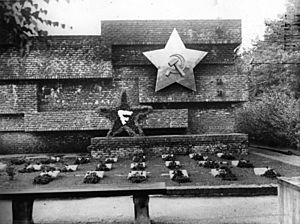
In 1919, Bertolt Brecht wrote the poetic memorial Epitaph honouring Luxemburg and Kurt Weill set it to music in The Berlin Requiem in 1928:
The famous Monument to Rosa Luxemburg and Karl Liebknecht, originally named Monument to the November Revolution (Revolutionsdenkmal) which was designed by pioneering modernist and later Bauhaus director Ludwig Mies van der Rohe and built in 1926 in Berlin-Lichtenberg and destroyed in 1935. The memorial took the form of a suprematist composition of brick masses. Van der Rohe said: "As most of these people [Rosa Luxemburg, Karl Liebknecht and other fallen heroes of the Revolution] were shot in front of a brick wall, a brick wall would be what I would build as a monument". The commission came about through the offices of Eduard Fuchs, who showed a proposal featuring Doric columns and medallions of Liebknecht and Luxemburg, prompting Mies' laughter and the comment "That would be a good monument for a banker". The monument was destroyed by the Nazis after they took power.
In the former East Germany and East Berlin, various places were named for Luxemburg by the East German communist party. These include the Rosa-Luxemburg-Platz and a U-Bahn station which were located in East Berlin during the Cold War.
An engraving on the nearby pavement reads "Ich war, ich bin, ich werde sein" ("I was, I am, I will be"). The Volksbühne (People's Theatre) is also on Rosa-Luxemburg-Platz.
Following the 1989 Peaceful Revolution and German reunification, CDU delegates on the Berlin city council recommended renaming all streets and squares honoring Karl Marx, August Bebel, Karl Liebknecht, Rosa Luxemburg, and Clara Zetkin. In a rare moment of agreement, both PDS and SPD delegates balked at this and the battle became so heated that an independent commission was appointed to advise on the question. The commission ultimately recommended the compromise, "that Communists who had died too soon to help bring Weimar down, or the GDR up, should not be purged". For this reason, both streets and squares in the former East Berlin continue to bear Rosa Luxemburg's name.
Dresden has a street and streetcar stop named after Luxemburg. The names remained unchanged after the German reunification.
At the edge of the Tiergarten on the Katharina-Heinroth-Ufer which runs between the southern bank of the Landwehr Canal and the bordering Zoologischer Garten (Zoological Garden), a memorial has been installed by a private initiative. On the memorial, the name Rosa Luxemburg appears in raised capital letters, marking the spot where her body was thrown into the canal by Freikorps troops.
The Federal Office for the Protection of the Constitution notes that idolisation of Luxemburg and Liebnecht remains an important tradition of far-left extremism in the Federal Republic of Germany. During the Cold War, Luxemburg and Liebknecht were idolised as martyrs by East Germany's ruling Party and continue to be idolised by its successor party: The Left.
Russia
Opponents and critics of the far-left have often had a very different interpretation of Luxemburg's murder. Russian historian Edvard Radzinsky has gone on the record as a very harsh critic of the Soviet Government for spending so much money abroad to fund the efforts of those like Liebknecht and Luxemburg to covertly destabilise and overthrow the Weimar Republic and other Western Governments. In the Soviet Union during the same time, mass starvation was taking place, first due to Vladimir Lenin's policy of War Communism and then to the Russian famine of 1921. According to Radzinsky, "Starving Moscow was feeding the Communist Parties of the whole world. People were swollen with hunger, but never mind, the world revolution was at hand."
Anti-communist Russian refugees occasionally expressed envy for the success of the SPD and the Freikorps in temporarily setting aside their political differences, even for just long enough to defeat the Spartacus Uprising, which was seen as an attempted German equivalent to the Bolshevik Revolution.
Elsewhere
Pavlivska Square in Kharkiv used to be called "площадь Розы Люксембург" (in Russian) and "майдан Рози Люксембург" (in Ukrainian). A street in Donetsk is still named after her, as well as another in Minsk and a number in Russia.
The British New Left historian Isaac Deutscher wrote of Luxemburg: "In her assassination Hohenzollern Germany celebrated its last triumph and Nazi Germany its first".
In Barcelona, there are terraced gardens named after her. In Madrid, there is a street and several public schools and associations named after Luxemburg. Other Spanish cities including Gijón, Getafe or Arganda del Rey have streets named after her.
There is also a monument in Luxembourg for "Lady Rosa" created by Sanja Iveković.
A street in Vienna has been named in Rosa Luxemburg's honour since 1947.
Two small international networks based on her political thought characterise themselves as Luxemburgists, namely the Communist Democracy (Luxemburgist) founded in 2005 and the International Luxemburgist Network founded in 2008. Feminists and Trotskyists as well as leftists in Germany especially show interest in Luxemburg's ideas. Distinguished modern Marxist thinkers such as Ernest Mandel, who has even been characterised as Luxemburgist, have seen Luxemburg's thought as a corrective to revolutionary theory. In 2002, ten thousand people marched in Berlin for Luxemburg and Liebknecht and another 90,000 people laid carnations on their graves.
Works
- The Accumulation of Capital, translated by Agnes Schwarzschild in 1951. Routledge Classics 2003 edition. Originally published as Die Akkumulation des Kapitals in 1913.
- The Accumulation of Capital: an Anticritique, written in 1915.
- Gesammelte Werke (Collected Works), 5 volumes, Berlin, 1970–1975.
- Gesammelte Briefe (Collected Letters), 6 volumes, Berlin, 1982–1997.
- Politische Schriften (Political Writings), edited and with preface by Ossip K. Flechtheim, 3 volumes, Frankfurt am Main, 1966 ff.
- The Complete Works of Rosa Luxemburg, 14 volumes, London and New York, 2011.
- The Rosa Luxemburg Reader, edited by Peter Hudis and Kevin B. Anderson.
Writings
This is a list of selected writings:
| Writing | Year | Text | Translator | Year of English publication |
|---|---|---|---|---|
| The Industrial Development of Poland | 1898 | English | Tessa DeCarlo | 1977 |
| In Defence of Nationality | 1900 | English | Emal Ghamsharick | 2014 |
| Social Reform or Revolution? | 1900 | English | ||
| The Socialist Crisis in France | 1901 | English | ||
| Organizational Questions of the Russian Social Democracy | 1904 | English | ||
| The Mass Strike, the Political Party and the Trade Unions | 1906 | English | Patrick Lavin | 1906 |
| The National Question | 1909 | English | ||
| Theory & Practice | 1910 | English | ||
| The Accumulation of Capital | 1913 | English | Agnes Schwarzschild | 1951 |
| The Accumulation of Capital: An Anti-Critique | 1915 | English | ||
| The Junius Pamphlet | 1915 | English | ||
| The Russian Revolution | 1918 | English | ||
| The Russian Tragedy | 1918 | English |
Speeches
| Speech | Year | Transcript |
|---|---|---|
| Speeches to Stuttgart Congress | 1898 | English |
| Speech to the Hanover Congress | 1899 | English |
| Speech to the Nuremberg Congress of the German Social Democratic Party | 1908 | English |
See also
 In Spanish: Rosa Luxemburgo para niños
In Spanish: Rosa Luxemburgo para niños
- Proletarian internationalism
- Rosa Luxemburg Foundation
- List of peace activists
- Clara Zetkin
- Nadezhda Krupskaya
- Alexandra Kollontai


